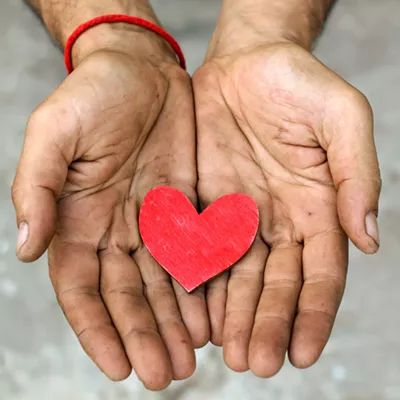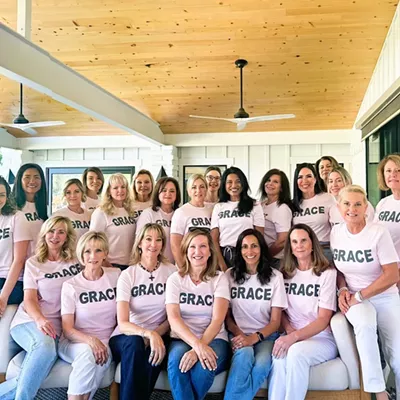There came a point in Heather McNeeley's life where she felt she had two options: indefinitely going in and out of prison or dying from the obscene amounts of heroin she injected herself with.
As she sat in jail, severely withdrawing from opiates and waiting for the consequences of a drug-sale felony conviction, McNeeley had her moment of clarity.
She was 21 the first time she went to prison. McNeeley worked in the fast-food industry, and sustaining her and her ex-husband's Oxycontin/heroin habit became economically unbearable. She stole some stuff and then pawned it. McNeeley did a year and a half for burglary. She could have been out on probation, but during that phase of her life sobriety seemed unattainable.
After trying weed at age 8, McNeeley grew up giving everything a go—meth, coke, acid and mushrooms. Heroin was the one drug McNeeley says she promised she'd never face. Toward the end of it all though, she was shooting at least 5 milligrams of it in her neck.
"When I first came out of prison, I couldn't get a job to save my life," she says. By then, she had tons of experience as a delivery driver; she'd work at movie theaters, at a call center and a daycare. Despite her addiction, McNeeley prided herself in her good work ethic. "Being a heroin addict, you are a junkie, and you are a felon. No one wants to help you. It doesn't matter how you did up until that point. It is really hard to convince someone that you are worth a second chance."
Sure enough, the big, fat "felon" label kept her from even getting an interview anywhere.
A 2011 report by the National Employment Law Project—a national advocacy group for employment rights—says that approximately 65 million adults in the U.S. cannot find a job because of criminal convictions, regardless of how qualified they may be for a position.
Eventually, the only way McNeeley could feed herself and the habit was to start selling drugs—which got her arrested the second time.
While in jail, she heard of the Pima County Attorney's Office Drug Treatment Alternative to Prison program. After her boyfriend bailed her out, McNeeley begged her public defender to fight for the relief, rather than sending her back to prison after being sentenced.
McNeeley was accepted into DTAP at the end of 2012, and it's been more than six months since she successfully graduated from the program. Now in her late 20s and sober for the past two years, McNeeley works full-time at The Haven—the rehabilitation clinic that pretty much revived her—helping other women going through very similar circumstances.
Around the time she was officially hired, the clinic gave her a scholarship to the Recovery Support Specialist Institute, where McNeeley got a certificate to work in the field. These days, she's going to college to get her associate's degree, and is helping the clinic open another patient care facility.
"If you asked me when I was in jail in 2012 ... I would have never thought, nobody, not even my parents thought I could do it," she says. "It is possible. You just have to find somebody to give you a chance, people to help you along the way."
Pima County is on board with giving people that clean slate.
On Nov. 10, the Pima County Board of Supervisors voted 4-1 to get rid of the criminal conviction history box from county job applications, and to delay any background check until later in the hiring process for certain positions (particularly ones that deal with "vulnerable populations," such as children, or law enforcement gigs). The resolution is already in effect, making Pima County the first in the state to a adopt "Ban the Box" policy. The City of Tucson inaugurated the movement in Arizona last year.
"Employers will look at you for being the human that you are today," says Pima County Supervisor Richard Elías, adding it's likely the county will want to extend the Ban the Box policy to vendors the county works with.
The ordinance was a collaboration between the county's Attorney's Office, the county administration, and local Ban the Box advocates like UA law professor Andrew Silverman, who says it is in our community's best interest to help employ the thousands of people who have been convicted of a crime, and support them in pursuing a "law-abiding" life.
"In order to even do that, most of them need a job, they need a place to live. Putting all of these barriers in front of them, particularly job barriers, really doesn't make any sense," he says. "It sets a good precedent, if you try to get a private employer (to ban the box), to be able to say, 'Well, your city and county have done it.'"
It's about not throwing people out from the hiring process from the beginning, and giving them the opportunity to meet employers face-to-face to advocate for themselves.
In a letter it submitted to the Board of Supervisors, the prison reform advocacy group American Friends Service Committee, stated that hiring discrimination happens 76 percent of the time for people with criminal convictions. "Having personal contact with a potential employer reduces the negative effect of a conviction history by 15 percent ... removing the impediment of a criminal record check box from initial applications will allow qualified job seekers to make in-person contact with hiring authorities, and thus increase their odds of gainful employment."
Seeing the question on an application deters an individual from even applying for a job, where the employer may have considered overlooking a criminal record, according to Chief Deputy County Attorney Amelia Cramer. Removing the check box is an encouragement. "These are people in the process of turning their lives around, to live drug free and crime free, a big part of being able to do that is the ability to find a job," she adds.
While working at The Haven, McNeeley says she's met some of the most hard-working women, also struggling with the stigma of being repeat offenders. McNeeley is happy to be there, and get them on their feet.
"How are you going to build up your self-esteem, and your self-worth? Eventually, the rejection is so self-defeating to your character," she says. "I had so much to overcome with myself. I had to get past my own mental thinking, 'I can't do it. I am a felon. I am a junkie, just like everybody thinks I am.' Addicts and felons need support from other people. They need to be shown that people believe in them, and want to give them a chance."








